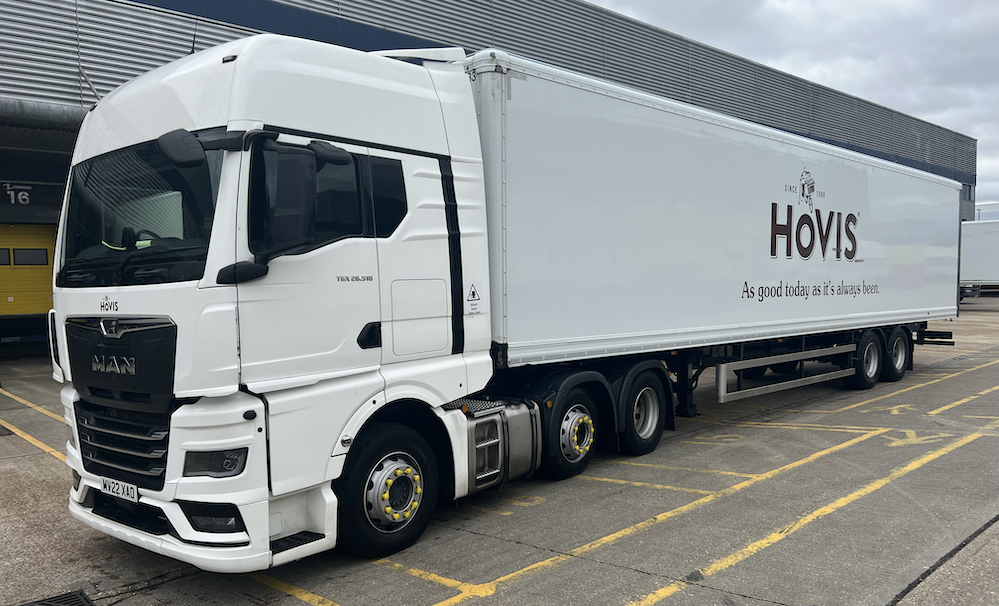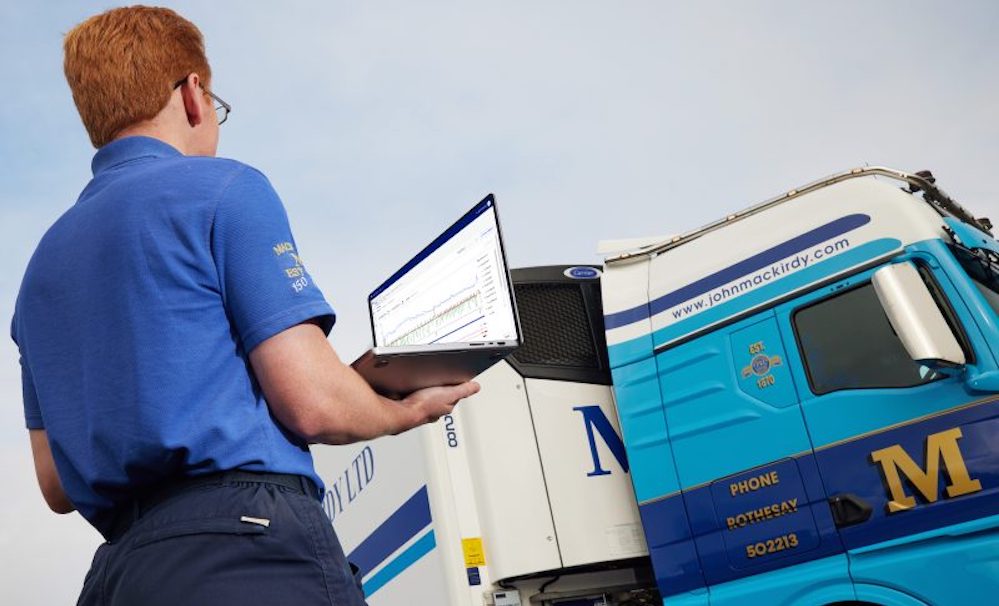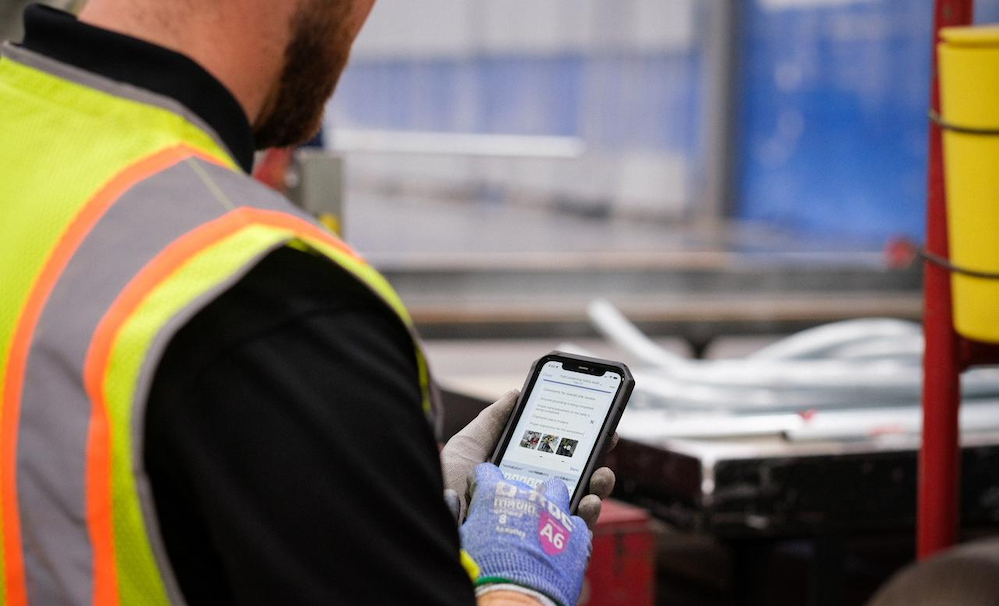Digitisation is changing the face of the logistics industry, as companies along the value chain are connecting digitally with one another. Logistics providers are taking on the new roles of process managers and data suppliers. To perform these tasks they require new vehicles and new digital services. Thus, the job of a vehicle manufacturer is changing too, into that of a service provider. Manufacturers must offer added value to truck operators by building vehicles that can be linked more closely to the logistics process than ever before. Mercedes-Benz Trucks is embracing its new role as a provider of digital services that optimise logistics processes, vehicle fleets and individual vehicles, and can now offer the Truck-as-a-Service. As a digital truck provider, Mercedes-Benz Trucks aims to help its customers by increasing vehicle availability and thus raising productivity.
Connectivity: technical prerequisites for the digital truck
In order to be able to take to the road as a digital truck, a Mercedes-Benz truck needs the necessary technical components. These include the Truck Data Center 7 or, for other brands with an EU-standardised Fleet Management Systems Interface (FMS), the Truck Data Center 7 (FB Card) as the control unit for vehicle communications. It receives vehicle, sensor and trailer data and uses a constant online connection for data transfer to the cloud-based back end. Drivers can access this information using the Mercedes-Benz User Interface HMI in the Multimedia Cockpit, as well as a multitude of apps which support them in their work. These are available on demand and can be installed via the Mercedes-Benz Truck App Portal.
Mercedes-Benz Truck App Portal: helpful applications for drivers
· New apps available
· Integration of international solutions
Fleet managers or dispatchers can install new apps via the Mercedes-Benz Truck App Portal that will make their driver’s working life easier. Applications from the Mercedes-Benz Truck App Portal provide practical help by intelligently compiling real-time information on use of the vehicle. They support the driver by providing instructions, for example, or monitoring the condition of their vehicle and its load, and make it easier to work through orders.
New features in the Portal include Cargofleet Trailer from idem telematics which exchanges data with trailers (for example, on the monitoring of cooling units), the communication solution YellowFleetApp, the mobile ServiceManager (mSM) for digital order management, the ‘on the go’ paperless order management (digital consignment notes) app CollectGo, the status tool App2Track, and the mobile scanner solution Scangaroo. However, the undisputed download champion to date is the Fleetboard Driver App. The aim is to increase the offering to include external apps by providers from other European countries.
Continental ContiPressureCheck: cutting costs for operators and improving safety
· Continental Tyres and Mercedes-Benz Trucks UK have created a new integrated digital TPMS
· Works with the 10-inch MultiTouch display in the new Actros
· Designed specifically to meet the unique safety requirements of fleets using trailers, especially multidecks.
In recent years the popularity of multideck trailers has steadily increased as more and more fleets, especially those operating within the grocery sector, recognise the environmental and cost benefits that higher load volumes offer. However, such trailer configurations are not without issues. A heavier load and greater frequency of use can lead to tyre pressure challenges and temperature build up around trailer wheels.
Now, a joint initiative between Continental Tyres and Mercedes-Benz Trucks UK provides an answer to this crucial safety issue. Utilising the advanced digital capabilities of Continental’s ContiPressureCheck and the increased in-cab functionality of the new Mercedes-Benz Actros, when specified with the Mercedes-Benz Truck App Portal, drivers and fleet managers can receive accurate information in real time on their trailer tyre pressures and temperatures, without the need for additional in cab displays.
The new fully integrated system is the first of its kind available in the UK and pairs data from the trailer tyre sensors with the in-cab Mercedes-Benz Truck App Portal. So, in the event of a pressure drop in a trailer tyre, or if the temperature around the tyre rises while driving due to increased load, drivers receive audible and visual dashboard warnings. The system has also been designed to be highly adaptable and will work on any type of trailer, not just a multideck.
The Continental standalone trailer system includes pressure/ temperature sensors mounted in the tyres, a control unit (CCU) positioned on the trailer chassis, a warning lamp fixed to the under/nearside of the trailer in sight of the drivers rearward view and a monitoring screen fixed to the bulkhead of the trailer. This additional display allows the driver to check the status of all trailer tyres very easily during daily checks. When connected to a Mercedes-Benz Actros, data is continuously fed to the multimedia dashboard via a Bluetooth connection into the Truck App Portal whenever the truck ignition is turned on. This information can also be sent in real time to fleet managers, using the cloud based ContiConnect portal.
A high-powered Bluetooth dongle links the trailer tyre data to the cab, highlighting the trailer’s schematics with live pressure and temperature readings. If an issue arises, an audible warning is sounded through the truck speakers, fading out any additional radio noise while it does so. The driver is then able to see the affected tyre or tyres on the multimedia display – the priority of the warning is indicated by the use of an amber or red colour. Tapping an alerted tyre on the in-cab display will provide more details and allow the driver take appropriate action immediately.
HABBL: a digital road to the destination
- Replacing analogue processes with digital logistics workflows
- Smooth transition between tasks inside and outside the truck
- HABBL Task manages jobs in the entire freight environment
With HABBL Transport, which comes to the UK in 2021/22, the truck becomes a logistics tool. The Mobile Workflow Management, which Daimler Truck AG took over from EIKONA AG in 2019, manages transportation processes and guides drivers through their tasks step by step. It will link vehicle information provided via Fleetboard, such as driving and rest times, or the GPS position with the current status of a journey.
HABBL represents an important milestone on the road towards an integrated ecosystem that links vehicles, trailers, infrastructure and sensor systems with assignments, loads and safety.
It stands out because it takes drivers through each day step by step.
HABBL Transport manages truck journeys, and operation of the HABBL app is intuitive. From departure checks with all the legally prescribed inspections, through precise recording of addresses in the navigation system, to the delivery receipts (POD), the system guides truck drivers step-by-step through their working days. HABBL supplies drivers with all the necessary information and ensures that all tasks are processed in the correct order. This prevents errors and enhances quality and efficiency. Users can create individual workflows for each customer, each trip or even each specific item of cargo. In this way HABBL can digitise the transportation process.
The HABBL app also incorporates impressive transparency. As the driver completes each phase of the job, all those involved in the process receive a current status notification. This means that dispatchers and, if required, senders and recipients are automatically updated on the progress of a trip, with information that includes the GPS position of the vehicle and its estimated time of arrival. HABBL will soon be able to factor in driving and rest times to provide more accurate projections.
The HABBL app can be installed directly to the Multimedia Cockpit in the new Actros via the Mercedes-Benz Truck App Portal. If the same trip has also been transferred to a mobile device the driver can seamlessly perform steps such as scanning, photographing, and accepting digital signatures, outside of the cab. Each stage is documented. HABBL Transport replaces the Fleetboard Transport Management service, for which manufacturer support finishes at the end of 2021.
With HABBL Task the app even manages tasks that have to be completed entirely outside the digital truck, irrespective of a trip. The Mobile Workflow Management also serves as a digital guide to employees undertaking other tasks, such as regular premises checks, forklift maintenance and facilities management. Among other benefits, it makes paper checklists a thing of the past.
Fleet optimisation: managing the big picture
Fleetboard is the service of choice for haulage company fleet managers and others. The telematics pioneer is entering the new era with a new technological platform and a modernised user interface.
Fleetboard: key information at a glance
- New modern customer interface
- GPS location every 30 seconds
- Portal display for using the assistance systems
- Notification Center informs proactively
- MB Uptime integrated
- Base telematics with the Fleetboard Manager app
The new Fleetboard Portal is fast, scalable and to the point. Following migration of the platform to the highly available Microsoft Azure Cloud, all services are currently being moved there and are gradually becoming available. UK customers will see the new interface in 2021. Updates and new features will also be available in shorter cycles in future. With the new customer interface, Fleetboard proactively presents particularly important information to users in the Notification Center. In future, for example, they will receive recommendations for action from MB Uptime, and report unexpected vehicle breakdowns. This enables fast reactions and saves considerable effort when it comes to investigations.
The new User Interface makes daily working life easier for users. It brings information into view more quickly and intuitively, and it integrates the intelligent telematics service MB Uptime. This means that in future fleet managers can use a Single Sign-on to manage, for instance, use of the vehicle as well as necessary repair and maintenance work in an optically uniform environment. Between now and the middle of next year Fleetboard users are being transferred step by step to this exciting new world.
The new Fleetboard customer interface also offers more comprehensive options for vehicle management: the live tracking now regularly updates the GPS positions of trucks every 30 seconds. Routes can be planned and the toll charges due calculated. For the first time, the application also makes information on the use of the safety assistance systems in the vehicles available centrally. It indicates when Active Brake Assist five (ABA 5) or Lane Keeping Assist (LDWS) have been switched off by the driver, and it determines how often the two safety systems were deactivated. Armed with this information fleet managers can raise their driver’s awareness of the importance of this potentially life-saving technology.
MB Uptime: Digital protection screen
- MB Uptime fully integrated in Fleetboard
- 50% fewer unplanned visits to the workshop
- As of Q1/2021 MB Uptime offers solutions for accident detection and for anti-theft protection
- Complete real-time support: recommendation for action after an average of 240 seconds
Only when a truck is on the move is it generating income for its operator. Mercedes-Benz Uptime can optimise vehicle availability by reducing unplanned visits to the workshop by up to 50%. In future the service will be fully integrated in the new Fleetboard interface.
Thanks to the intelligent linking of the sensors and systems installed in the vehicle fleet managers can call up information on the vehicle’s condition at the press of a button. In critical cases the service also informs them proactively via automatic messages.
With over 1200 controls, MB Uptime analyses critical conditions of over 40 vehicle components and control units. If the system detects the need to act, it informs the operator’s stipulated contact and the designated workshop chosen by the customer, stating the appropriate recommendation for action. And it does all of this within an average of just 240 seconds! Prior notification can significantly reduce the time needed for fault diagnosis on site prior to repair. The significant reduction in vehicle downtime means drivers and vehicles spend more time on the road, and fleet managers can schedule their resources more reliably.
The scope of functions of MB Uptime is continually being extended and improved. The aim, by the first quarter of 2021, is for the service to detect certain vehicle conditions which imply an accident, as well as the triggering of the alarm system installed for anti-theft protection. Trips to the workshop for software updates for the telematics service are no longer necessary. They are conveniently conducted over the air and automatically installed in the vehicle.
Over 1,500 specially trained and certified Mercedes-Benz Retail operations are connected to the service offered throughout 19 European countries. This is why more than half of all Mercedes-Benz Trucks customers* are already relying on MB Uptime. They recognise and appreciate the benefits of a truck fleet with significantly increased availability.
*Average value based on vehicles with Truck Data Center in Uptime markets in 2019
Conclusion: virtually unrestricted transportation capacity – digital trucks keep on running
Today’s Mercedes-Benz trucks are digital trucks. With the Truck Data Center as the back end and intertwining services they offer an intelligent chain of digital connections:
- They optimise logistics management with apps such as HABBL
- They improve digital fleet management with the new Fleetboard
- They elevate the savings potential for vehicles to a new level with the MB Uptime integrated in Fleetboard.
Drivers and fleet operators feed their vehicles with key information on transport assignments, always with the aim of extending the trucks’ usability. By being constantly available for use and making the logistics process more efficient, they themselves become a truck-as-a-service. In this way Mercedes-Benz Trucks is supporting its customers on the road to unrestricted transportation capacity.








